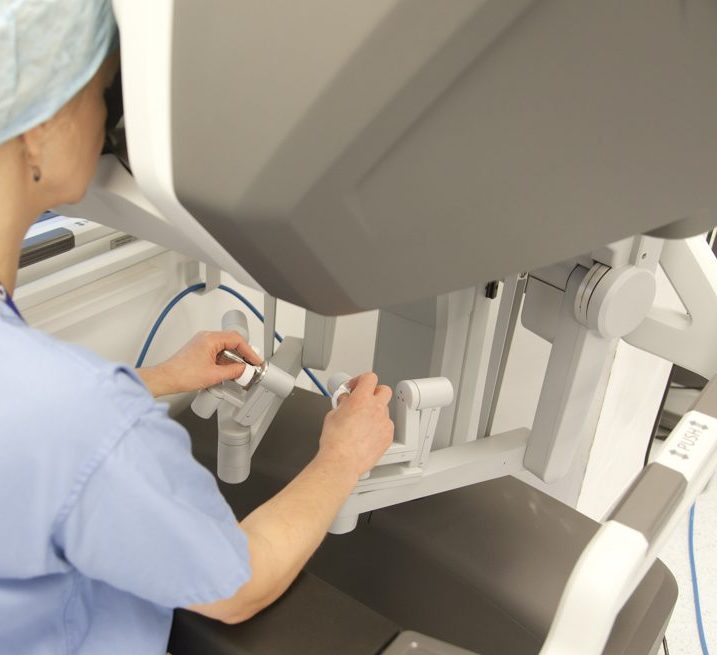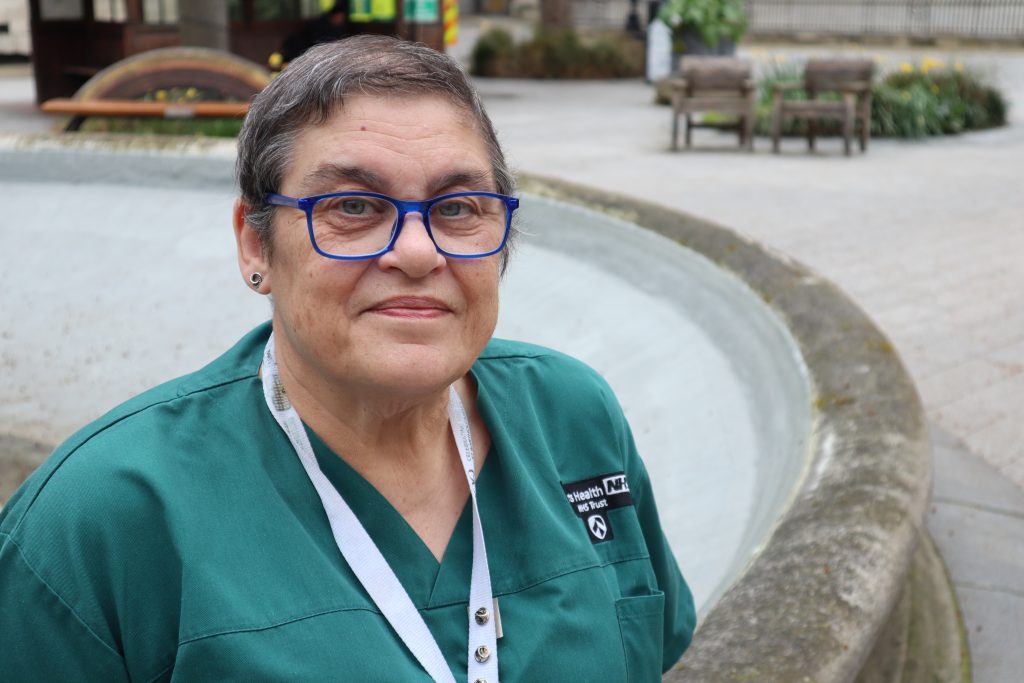More than 2,000 patients have benefitted from robotic surgery at Barts Health NHS Trust since our funding in 2017.
Our new multi-million pound investment will bring three new surgical robots to Barts Health hospitals, increasing access to this minimally invasive procedure for a greater range of conditions than ever before. Not only will more patients in our East London community benefit, but patients from surrounding areas of London will be eligible for referral. In some cases, patients may be referred nationally.
For the first time, cardiac robotic surgery will be available in the south of England.
Bringing minimally invasive robotic surgery to more patients
Our £7.6m funding will enable Barts Health NHS Trust to expand its successful robotic surgery programme.
This builds on funding we made in 2017 which established St Bartholomew’s Hospital and The Royal London Hospital as successful centres for robotic surgery for thoracic, gynaecology, urology, ear nose and throat (ENT) and hepatobiliary procedures. In that time, more than 2,000 patients have benefitted from robotic surgery. At St Bartholomew’s Hospital, the proportion of people receiving minimally invasive surgery has increased from 60% to 95%.
We are delighted to support the expansion of this programme to more patients in East London.
This new funding will bring three additional robots: one each to St Bartholomew’s Hospital and The Royal London Hospital and, for the first time, Whipps Cross Hospital. The new funding will:
- Increase access to robotic surgery at St Bartholomew’s Hospital and The Royal London Hospital
- Introduce robotic cardiac surgery to St Bartholomew’s Hospital, currently unavailable in the NHS in the south of England
- Introduce robotic surgery to Whipps Cross Hospital
- Introduce a greater range of conditions that can be treated including heart, kidney transplant and colorectal robotic surgery
- Increase the capacity for referrals from the surrounding areas and, in some cases, nationally.
What is robotic surgery?
Surgeons use robots to perform a growing number of surgical procedures in the NHS for a range of complex procedures, including endometriosis and gynaecological cancers. These often need keyhole or open abdominal surgery which lead to long and painful recovery times.
Robotic surgery is minimally invasive (using smaller surgical cuts) and precise. This can lead to fewer complications and improve recovery times. In many cases, patients can leave the hospital the same day and recover at home, returning to normal life soon after surgery.
Surgeons operate the robot’s interactive mechanical arms from a console positioned behind the patient, allowing them to control small instruments and view the operation through a magnified immersive viewer.
This allows the surgeon to be precise and accurate, resulting in shorter operating times. Because surgeons can sit down during the procedures, they can feel less fatigued and then able to perform more operations.

A first for cardiac robotic surgery in the south of England
St Bartholomew’s Hospital will become the first hospital in the south of England to offer cardiac robotic surgery. This builds on an established and internationally successful programme in thoracic surgery, as a result of our original funding.
In 2022, we supported the training that has laid the groundwork for the cardiac robotic surgery programme at St Bartholomew’s Hospital. This has been generously supported by a donation from The Alamouti Family.
“I have seen over 1,600 patients benefit from innovative and complex surgery for chest tumours, lung cancers and advanced emphysema because of the first robot. Patients are going home in better condition and earlier. This second robot will enable our robotic thoracic service to treat more patients and provide the only robotic cardiac service in the UK to move on from coronary to valvular surgery.”Sasha Stamenkovic, Director of Robotic Surgery and Thoracic Surgeon at St Bartholomew's Hospital
Increasing capacity for women’s health services
The Royal London Hospital introduced a multidisciplinary robotic surgery programme that has helped patients in gynaecology, urology, ear nose and throat (ENT) and hepatobiliary.
Since our original funding in 2017, the gynae–oncology (cancers that start in the female reproductive system) team has been able to significantly increase the number of obese and morbidly obese patients undergoing minimally invasive surgery after showing that there is no difference in the length of stay or frequency and severity of complication rates between obese, morbidly obese and non-obese patient.
The addition of a new robot will bring the benefits of robotic surgery to even more patients.
“I am absolutely delighted that Barts Charity has agreed to fund three additional surgical robots for the Trust. This will enable us to improve patient outcomes and equity of access for patients in East London and beyond through the expansion of robotic minimally invasive surgical (MIS) capacity. As a robotic Gynaecological Oncology surgeon at The Royal London Hospital, I have seen first-hand the amazement my patients have had at the lack of pain after a robotic hysterectomy and the ease of their recovery. We can now offer the benefits of robotic surgery to even more women under our care, easing their recovery from cancer surgery.”Elly Brockbank, Consultant Gynaecological Oncologist at The Royal London Hospital
Susan’s story: “I think robotic surgery is the way forward.”

Susan Hassan, Support Worker at St Bartholomew's Hospital
When Susan started to notice some unusual spotting, she visited her doctor who carried out some tests. To help prevent any future complications, Susan was offered a hysterectomy using robotic surgery at The Royal London Hospital.
Unlike a normal hysterectomy, robotic surgery makes just a few incisions. For Susan, this meant a quicker and more comfortable recovery, with less need for pain relief.
“After the operation, I got out of bed the same night and was walking around. I felt ready to go home! I had no pain at all afterwards - I didn’t take a single painkiller, no antibiotics, nothing. I had no side effects at all. I thought I’d be doubled over in pain, not being able to lift anything, but I just felt totally normal.”
Transforming gynaecological surgery
Whipps Cross Hospital has developed an international reputation for addressing diversity in its provision of women’s health care. Our funding will enable Whipps Cross, for the first time, to bring the benefits of robotic surgery to our local population by providing gynaecological robotic surgery, alongside general surgery.
“Whipps Cross is now poised to ensure equitable access to ground-breaking surgical care. This not only enhances our ability to deliver exceptional outcomes but also reaffirms our commitment to pioneering medical excellence for the communities we serve. We have an exceptional surgical team here at Whipps and the addition of a robot will continue to allow us to motivate and retain our staff as well as attract the best surgeons to join our team”Funlayo Odejinmi, Consultant Gynaecologist at Whipps Cross Hospital
Fiona Miller Smith, CEO at Barts Charity said:
“We are proud to support the expansion of the robotic surgery programme at Barts Health NHS Trust, which will mean more of our local population will now be able to access minimally invasive surgery, creating a better equity of access to these services. This will build on the outstanding success of our earlier investment to establish the programme, which has already benefitted thousands of our patients.”


